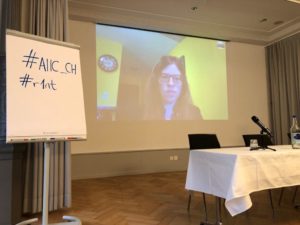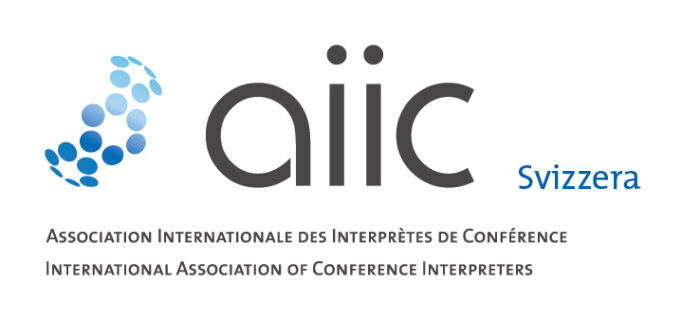Geneva, February 2020, Phil Smith
 A piercing jolt
A piercing jolt
Sometimes you get a loud noise in your headset that can be caused by feedback, someone clattering the mic with documents or even people tapping the microphone to make sure the system is working, a bit like kicking the tyres to make sure your car is roadworthy.
Kathleen Ratel of the AIIC Canada has carried out research into the short and long-term effect of sound surges (aka acoustic shocks). On 30 November 2019 she addressed the Swiss region via Skype. Canada seems to be in the lead on this particular issue.
We had received a questionnaire before the meeting to find out who among us had suffered from acoustic shocks; apart from the occasional nuisance of feedback nobody appeared to have suffered a genuine acoustic shock.
Interpreters are very sensitive to noise. We’ll decide to go to a different restaurant because of the din, ask people to turn down the muzak or insist the children practice the bagpipes at the bottom of the neighbour’s garden.
 Kathleen explained that sudden and loud noise could affect our hearing, cause headaches and even diminish cognitive capacity. There is a theory – yet to be proven empirically – that repeated exposure to acoustic shock can cause lasting damage. The precautionary principle suggests, well, caution. Research has shown that people who work in call centres are most at risk.
Kathleen explained that sudden and loud noise could affect our hearing, cause headaches and even diminish cognitive capacity. There is a theory – yet to be proven empirically – that repeated exposure to acoustic shock can cause lasting damage. The precautionary principle suggests, well, caution. Research has shown that people who work in call centres are most at risk.
In a regular setting surge-control is built into the equipment; we sometimes hear it springing into action at a meeting, it sounds like a soft thud followed by a drop in sound. It is activated when people get too close to the mic. We’ve all suffered feedback when delegates leave their headset near an open mic. These built-in protective systems only work with the mics supplied with the system, so check before plugging in your own headset that it is compatible with the existing surge control
If remote interpreting is done using telephone lines – we’re not saying it’s a good idea – the interpreters get something like 25% of the sound so we tend to jam up the volume, which is when a sudden noise can damage our hearing.
All interpreters should have their hearing tested early in their career, so they have a baseline for comparison of any subsequent hearing loss because of an acoustic shock.
Be aware of the potential for acoustic shocks and use technically compatible equipment.
But don’t be downhearted, just think of the magic that Jimi Hendrix created using feedback and Fender.
Please also read the resumee of the first remote interpreting workshop organised by AIIC Switzerland and Phil Smith’s “booth camp” article on remote simultaneous interpreting.
Sign up to the second remote interpreting workshop that will be organised by AIIC Switzerland in February 2020 here.
